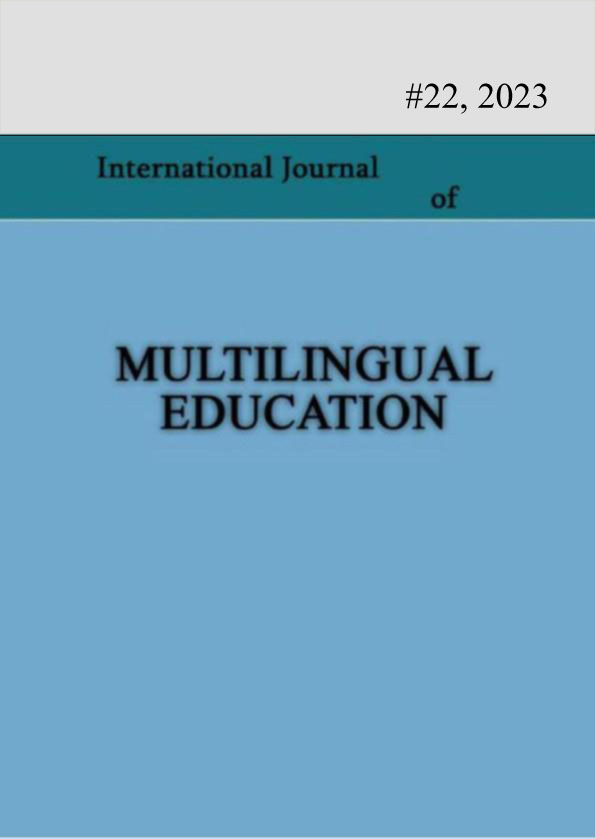A whole cloud of history, culture and society and a drop of semantics: A reversible binomial as a form of address in Georgian
Keywords:
forms of address; Georgian; reversible binomial; gender; Natural Semantic MetalanguageAbstract
The paper is an attempt to reflect on various aspects of a reversible binomial form of address, a
Georgian equivalent of the English formula for addressing an audience Ladies and Gentlemen.
The discussions of its constituent terms within the system of Georgian forms of address, of their
etymology and semantic development, of some aspects related to its combinability with other
terms lay a foundation for establishing explications of both its individual constituent terms and
the reversible binomial form of address (including its both feminine-first and masculine-first
variants, the ordering principles of which hardly pertaining to a speaker’s gender preferences)
based on the Natural Semantic Metalanguage approach. All of these aspects of the investigation
facilitate identification of various, normally both language- and culture-specific peculiarities of
the form and terms in point.
References
Abuladze, L. & Ludden, A. 2013. The Vocative in Georgian. In B. Sonnenhauser & P. Noel Aziz Hanna (eds.), Vocative! Addressing between System and Performance, (pp. 25-42). Berlin & Boston: De Gruyter Mouton.
Apridonidze, S. 1991. Literary and dialectal forms of address in Georgian. Studia Linguistica, 45 (1/2), 136-145.
Akhvlediani, G. (1965). Sit’q’vas ecvleba mnišvneloba [A word changes its meaning]. Sakartvelos kali [Georgian Woman], 5, 21.
Boeder, W. (1985). Zur Grammatik des Vokativs in den Kartwelsprachen. In U. Pieper & G. Stickel (eds.), Studia Linguistica. Diachronica et Synchronica. Werner Winter Sexagenario Anno MCMLXXXIII gratis animis ab eius collegis, amicis discipuliske oblata, (55-80). Berlin, New York, Amsterdam: De Gruyter Mouton.
Braun, F. (1988). Terms of Address: Problems of Patterns and Usage in Various Languages and Cultures. Berlin: De Gruyter Mouton.
Deeters, G. (1926). Armenisch und Südkaukasisch. Ein Beitrag zur Frage der Sprachmischung.
Caucasica, 3, 37-82.
Keser, B. M. & Pachulia, L. (2021). Gürcüce-Türkçe Nezaket ve Hitap Kullanımındaki Benzerlikler ve Gamkrelidze, Th. V. & Ivanov, V. V. (2010). Indo-European and the Indo-Europeans: A reconstruction and historical analysis of a proto-language and a proto-culture. Berlin & New York: De Gruyter Mouton.Farklılıklar. Manisa Celal Bayar University Journal of Social Sciences, 19/2, 155-170.
Kajaia, O. (2002). Megrul-kartuli leksik’omi [Megrelian-Georgian dictionary], Vol. 2. Tbilisi: Nekeri. Kaladze, T. (1984). Saxel-mamisaxelobiti mimartvis šesaxeb kartulši [On the first name+patronymic
Downloads
Published
How to Cite
Issue
Section
License
Copyright (c) 2023 Zaal Kikvidze

This work is licensed under a Creative Commons Attribution-NonCommercial 4.0 International License.
Copyright (c) - Authors who publish with this journal agree to the following terms: Authors retain copyright and grant the journal the right of first publication with the work simultaneously licensed under a Creative Commons Attribution-Noncommercial 4.0 International License, which allows others to share the work with an acknowledgement of the work's authorship and initial publication in this journal. Authors are permitted and encouraged to post their work online (e.g., in institutional repositories or on their personal website) prior to and during the submission process, as it can lead to productive exchanges, as well as earlier and greater citation of published work (see The Effect of Open Access). Authors may enter into separate, additional contractual arrangements for the non-exclusive distribution of the journal's published version of the work (e.g., post it to a repository or publish it in a book), with an acknowledgement of its initial publication in this journal.

